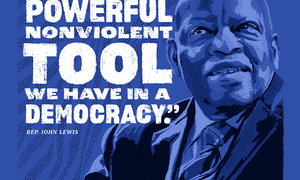“The Vote Is Precious”
The anniversary of the Jan. 6 insurrection at the U.S. Capitol is a reminder of the dangers to our democracy and an essential part of honestly confronting our nation’s history as we contextualize the present moment.
We offer this new One World poster with a quote from Rep. John Lewis as a preview of our upcoming “Democracy for the 21st Century” publication and to begin our conversations on democracy this year. And we share a look back at Rep. Lewis’ reflections, which remain relevant and vital in 2026.

John Lewis


Media Literacy Is Vital for Informed Decision-Making
Learning for Justice 2025 Wrapped
“The ebbs and flows of history show us how oppressed groups have shifted power to advance our civil and human rights. The challenge of our time is who will control the political power so democracy is fully realized and all our humanity is fully recovered.”
— Jalaya Liles Dunn, Director, Learning for Justice, from “Making Recovery Last: A Season for Radical Reconstruction”

The Roles and Responsibilities of the President

Understanding the Role and Responsibilities of the Department of Education

Why the 1965 Voting Rights Act Is Crucial for Democracy
Cultivating Hope and Nurturing Children and Families
This holiday season, we offer resources for children and families to deepen our democratic values and celebrate our shared humanity. Let’s consider the ways we can come together in our communities to cultivate hope and nurture all our children and youth.

Growing Together: For Children and Families

Liberation Lit

Youth Learning For Justice
Celebrate Native American Heritage
Native American Heritage Month provides an opportunity to celebrate the diversity of Native cultures and communities. To honor Native peoples, we uplift their honest histories, significant contributions and contemporary experiences.

Celebrate Native American Heritage

Debbie Reese on Book Bans and Native Representation

Celebrating African and Indigenous Cultures
Our Votes Matter in All Elections
We should never take for granted our rights and our responsibilities to engage in civic action and vote in every election — local and national.
The 1965 Voting Rights Act (VRA) is a landmark federal law and a significant victory of the Civil Rights Movement. Enacted to remove the barriers of racist Jim Crow era policies, the VRA affirmed the right to vote for millions of African Americans. Enforcement of this law has expanded political opportunities for Black Americans and other people of color.

Our Votes Matter: Action Steps in Planning to Vote

Media Literacy Is Vital for Informed Decision-Making
